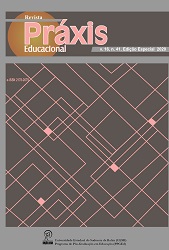CHARACTERISTICS OF RESEARCH THAT INVESTIGATED TEACHER TRAINING IN BRAZIL THROUGH PRACTICE COMMUNITIES
DOI:
https://doi.org/10.22481/praxisedu.v16i41.6415Keywords:
Communities of practice, Education research, Teacher educationAbstract
This article aims to understand characteristics of research in education that investigated teacher education in Brazil through communities of practice. Research published in the capes thesis and dissertation database over the past ten years was analyzed. This is a qualitative, state-of-the-art review research. In this perspective and through the descriptors: Community of practice, teacher training and teacher training resulted in 21 surveys. Of these, we analyze the main themes addressed, the objectives, the theoretical support and the results obtained. We observed that the main themes involved initial and continuing teacher training, the community of practice being a process used with a collaborative focus, integrating information and communication technologies. Most research objectives are classified as propositional, and descriptive. Among the authors, Wenger (2001) stands out when it comes to the Community of Practice, Fiorentini (2014), Gatti (2010), Imbernón (2009) and Nóvoa (2009) when dealing with teacher training and Almeida (2008) was the most cited when related to ICT in Education. We infer that current proposals about teacher training indicate positive contributions when they involve communities of practice, as it translates into an effective and modern teacher professional development strategy that resignifies the training spaces and the teaching identity itself. Research also indicates that the use of the community of practice as an instrument for the professional development of teachers opens doors to Communication and Information Technologies, innovating proposals that value and encourage sharing among professionals.
Downloads
Metrics
Downloads
Published
How to Cite
Issue
Section
License
Copyright (c) 2020 Práxis Educacional

This work is licensed under a Creative Commons Attribution-ShareAlike 4.0 International License.
You are free to:
Share - copy and redistribute the material in any medium or format; Adapt - remix, transform, and build from the material for any purpose, even commercially. This license is acceptable for Free Cultural Works. The licensor cannot revoke these freedoms as long as you follow the terms of the license.
Under the following terms:
Attribution - You must appropriately give credit, provide a link to the license, and indicate if any changes have been made. You may do so in any reasonable way, but not in a way that suggests that you or your use is endorsed by the licensor.
There are no additional restrictions - You cannot apply legal terms or technological measures that legally restrict others to make any use permitted by the license.










